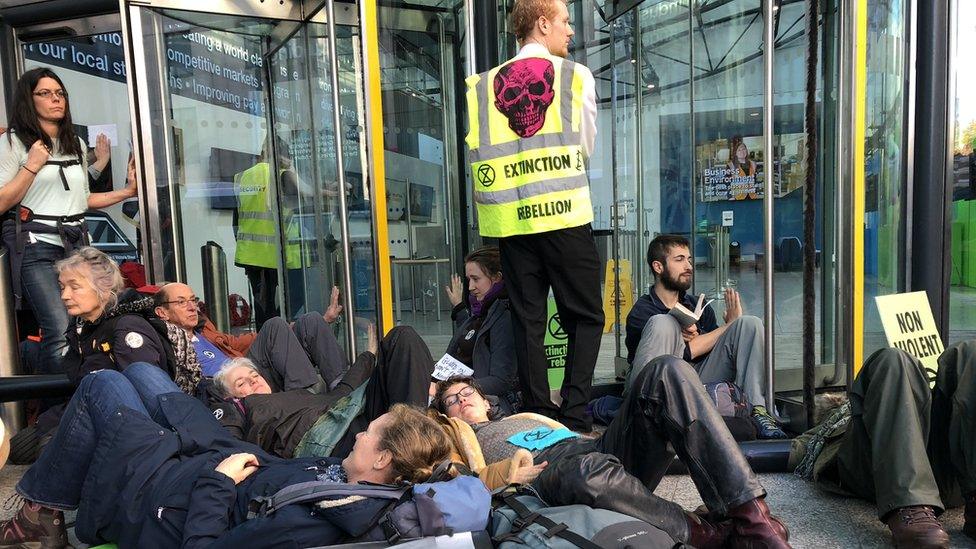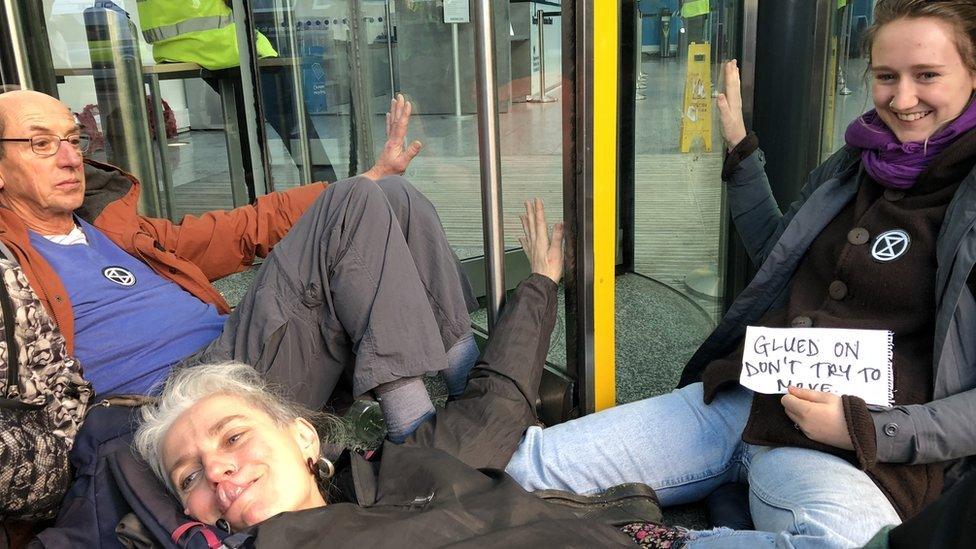Climate change protests leads to '22 arrests' over blockade
- Published

Protesters lay chained together on the pavement outside the UK government's energy department
Environment activists who have blockaded the UK's energy department in London say 22 people have been arrested during the protest.
The Met Police confirmed at least eight protestors have been detained.
The UK is seen as a leader in policies to reduce greenhouse gases and will soon be considering tougher targets.
But the protesters say research suggests the chance of keeping the global temperature rise under a 2C danger threshold is just one in 20.
The demonstrators blocked entry to the offices by lying chained together on the pavement, while some glued themselves to the doors of the department building.
Further protests are planned through the week and the demonstrators believe the public will take them seriously, as they are willing to go to jail for their cause.

Some demonstrators also glued themselves to the door of the building
They compare themselves with the suffragettes, the anti-apartheid movement, the followers of Gandhi, and the US civil rights movement, although their critics point out that these groups didn't have the vote.
They have declared Saturday as Extinction Rebellion Day – the day they’ll commit acts of civil disobedience in the hope of jolting governments round the world into stronger action.
Why are they happy to be arrested?

Gail Bradbrook says she wants to protect the planet for her children's sake
One of the protesters, Gail Bradbrook - a mother of two from Stroud - said: “I want the planet protected for my children.
“Change comes when people are willing to commit acts of peaceful civil disobedience.
“Fifty people in jail for a short time is likely to bring the ecological crisis into the public consciousness.”
The first mass meeting of the organisation last month drew 1,000 people to Westminster and blocked roads for two hours. There were 15 arrests.
The organisers insist that this week’s actions will be non-violent. They say if protesters commit an illegal act, they must stay on the spot to face the police.
The police told BBC News they expected disruption on Saturday and were prepared for any level of protest.
A member of the London Mayor’s office wondered privately if the protesters thought that freeing protesters from cycle locks was a good use of police time.

Lizia Wolf said she felt compelled to act
But Lizia Wolf told BBC News she felt compelled to act.
“The facts and figures are easily accessible if you have the stomach to look, but here within Extinction Rebellion and certainly with myself, is an offer of friendship, guidance and mutual grief.
“The first step towards creating the changes necessary for survival - and towards solving any problem in general - is to acknowledge the utterly terrifying situation we are in.”
What do they want?
The protesters’ short-term aims are to cancel what they call “contradictory” projects they say will actually increase emissions in the UK, such as the third runway at Heathrow, fracking and the £30bn roads programme.
Their long-term aims are to:
Oblige cabinet members to “tell the truth” about the seriousness of the environmental crisis
Make the UK carbon neutral by 2025 (the government is considering 2050 as a date for that)
Set up a People’s Assembly of ordinary citizens to decide priorities for reshaping the economy so that protecting the climate becomes Number One priority
What are their chances of success?
The aim of persuading some cabinet members to speak out may possibly be achievable.
But experts say achieving a zero-emissions economy by 2025 isn’t in any scenario. It would need a revolution in transport, home insulation, energy efficiency, agriculture and more.
Setting up an assembly of mostly randomly selected citizens to take charge of the great economic shift will surely not be accepted by politicians.

Tiana Jacout says she is happy to give up her freedom for the cause
At the media launch of Extinction Rebellion, one young woman teared up, asking whether runaway climate change was an acceptable choice, when it was suggested that their demands were unlikely to be met.
Another protester, Tiana Jacout, 31, from Bristol, told BBC News: “Finally! Someone has given us all permission to rage against the idea that we are barrelling towards extinction.
“We have been invited to decide, between those unbearable nights of watching the slow-moving car crash that is how humanity treats the world, or standing up for the world we know is possible.
“I am happy to give up my freedom for the idea of that, that others can see a better world."
The protesters were boosted by a letter from 100 academics in the Guardian, external – including the former Archbishop of Canterbury, Dr Rowan Williams.
It said the failure of politicians to tackle climate breakdown and the growing extinction crisis means “the 'social contract' has been broken… [and] it is therefore not only our right, but our moral duty to bypass the government’s inaction and flagrant dereliction of duty, and to rebel to defend life itself.”
Do scientists agree?
Despite uncertainties in forecasts about the rate of heating, many senior scientists working on environmental change are genuinely alarmed by the huge risks mankind is taking.
But can the UK really de-carbonise by 2025? Three professors concerned about the issue - Peter Cox, Jim Skea and Piers Forster - did not believe the timetable demanded by the Extinction Rebellion was possible.
To the protesters, this won’t matter much.
They’re harnessing new media to shake up what they see as society’s complacency.
They say failing to protect the climate isn’t an option.
Follow Roger on Twitter @rharrabin, external